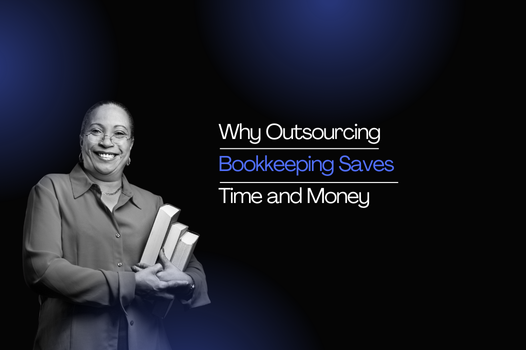Why Outsourcing Bookkeeping Saves Time and Money

By Samunnati Shrestha, Creative Lead at BIN
Category Accounting and Bookkeeping
Published June 27 2025
Bookkeeping is an essential yet time-consuming task for any business, especially for startups and small enterprises with limited resources. Managing financial records, tracking expenses, and reconciling accounts require precision and consistency. When handled in-house, it can take valuable time away from strategic activities like product development or customer engagement.
Outsourcing bookkeeping helps reduce operational costs and frees up internal bandwidth to focus on growth. It ensures accuracy while minimizing the risk of financial errors.
Cost Efficiency Compared to In-House Hiring
Building an internal bookkeeping team often seems appealing until the hidden expenses surface. Hiring involves recruitment costs, salary negotiations, onboarding, training, benefits administration, and ongoing software licenses. For early-stage companies or lean operations, a full-time bookkeeping hire rarely makes financial sense. Scaling staff to match seasonal or monthly workload fluctuations further complicates budgeting and resource planning.
Outsourcing eliminates those fixed overheads. You pay only for the hours and services you need without commitment to long-term employment contracts. Outsourcing providers adjust staffing based on your monthly volume, busy months mean more support, quieter periods reduce costs. The ability to flex with your business saves companies from paying for idle capacity while still ensuring accurate, up-to-date financial management throughout growth phases.
Furthermore, outsourcing firms benefit from investing in best-in-class infrastructure across clients. Part of your subscription covers encrypted cloud access, secure data backups, team collaboration tools, and audit-ready systems. You gain enterprise-level resources without the capital expense. As your business grows, your bookkeeping remains robust, ready to scale without additional investment in hardware, personnel, or training.
Regulatory Compliance and Reduced Risk
Navigating financial regulations, tax legislation, and industry compliance rules poses a significant challenge especially as regulations vary across regions. Inexperienced in-house bookkeepers may miss important deadlines, skip VAT filings, struggle with tax code updates, or misinterpret allowable deductions. These errors translate to fines, audit risk, and reputational harm.
Reputable bookkeeping providers stay up-to-date on legislative changes across jurisdictions. Their staff receives ongoing training, and standardized processes include compliance checkpoints. Your financial data remains aligned with government requirements. You also benefit from having documented trails: reconciled entries, time-stamped logs, audit reports, a level of transparency that creates trust with authorities and external stakeholders.
In addition, outsourcing offers professional indemnity and liability safeguards. Service agreements often include clauses protecting you from errors or omissions made by the provider. In the event of a compliance issue, this cover provides peace of mind. Rather than scrambling to fix problems or scrambling under pressure during tax audits, you’re backed by a team trained to foresee and prevent regulatory risk.
Uninterrupted Focus on Mission-Critical Work
Founders wear many hats from product development and customer acquisition to operations and strategic planning. Assigning bookkeeping duties to an existing team member or attempting it yourself leads to split attention and competing priorities. Tasks get delayed, invoices go unrecorded, and reconciliation falls behind. Without a clear financial picture, planning and decision-making suffer.
Outsourcing removes this distraction. You gain dedicated experts who ensure financial operations remain current while you concentrate on areas that grow your business. Since bookkeeping updates are part of the service agreement, you can rely on consistent deliverables weekly reconciliations, monthly P&Ls, and quarterly budgets without internal intervention. You reclaim time to innovate, land deals, serve customers, and scale.
Moreover, this structure empowers your internal teams. You avoid burdening staff with responsibilities outside their expertise. Instead, employees remain focused on core priorities marketing campaigns, product features, customer service knowing that financial operations are professionally managed in the background.
Enhanced Scalability and Flexibility
As businesses grow, bookkeeping complexity increases. Expanded product lines, additional bank accounts, payroll, vendor contracts, global payments, all introduce new accounting layers. Attempting to scale manually in-house often breaks processes and causes errors.
Outsourcing firms are structured to manage that growth. They use flexible platforms and modular staffing arrangements. Whether expanding into e-commerce, launching a new region, or handling seasonal cycles, they scale alongside your needs. Their systems support multi-entity accounting, inter-company reconciliations, tax code changes, and payroll complexities without requiring separate hires.
As a result, your bookkeeping operation scales seamlessly. You aren’t hiring multiple staff across finance, payroll, or accounts payable. You also avoid the risk of growing pains: delayed closes, messy audits, cash-flow forecasting gaps. The service continues smoothly, your financial health remains reliable, and you maintain investor and stakeholder confidence.
Strategic Insights and Proactive Guidance
Bookkeeping is more than recording transactions and balancing bank accounts. Great outsourced services transform numbers into insights. When professionals manage your books, they notice trends, anomalies, and opportunities that might otherwise be overlooked. Perhaps receivables are aging faster, vendor pricing has increased, or cost centers are underperforming.
Proactive service providers flag issues before they escalate. They may recommend tighter credit controls, better invoice follow‑ups, or optimized expense structures. Monthly catch‑ups become strategy sessions, not busy work. As part of the relationship, you receive clear financial dashboards that highlight KPIs: cash flow, revenue trends, margins giving you control and foresight to shape your path.
When supported by BIN, this becomes even stronger. Our team knows your industry benchmarks and business stage. We anticipate financial challenges common to startups, SaaS firms, or service agencies. That insight guides smart planning. In short, outsourcing delivers not just accuracy, but foresight and advice tailored to where you want to go.
Integrating Technology Without Overhead
Modern bookkeeping leverages automation, OCR (optical character recognition), bank feed syncing, AI classification, and cloud collaboration. For many small businesses, investing in, configuring, and operating these technologies is daunting both in cost and time. Without IT capacity, the promise of automation goes unrealized.
When you outsource, you gain seamless access to platforms that streamline bookkeeping. Receipts are captured with apps, bank feeds reconcile automatically, and categorization improves over time with machine learning. Collaboration happens in shared ledgers with live comments and client review features. Because your provider maintains the stack, you gain speed and efficiency without managing tools yourself.
This not only saves time, but improves data hygiene. Fewer manual imports and copy‑pastes means fewer errors. Reporting becomes easier, forecasts become clearer, and taxes become less taxing.
Better Cash Flow Management and Forecasting
On-time invoicing, reminders, and cash-flow tracking are essential to business health. Missed follow-ups mean late payments and strained vendor relationships. Without structured invoicing processes, cash shortages become an unwanted surprise.
Outsourced bookkeeping teams handle invoices on time, send reminders, and flag aged receivables. They track payments, compare expected income to bank deposits, and alert you to discrepancies. That attention ensures clients pay faster and vendors are paid on time preserving your credibility.
Moreover, firms often provide cash-flow forecasts, projecting short-term inflows and outflows. They analyze revenue and expenses to predict financing needs. This foresight guides operational decisions delaying hires, negotiating terms, planning promotional campaigns based on actual financial runway rather than guesswork.
Seamless Audit and Investor Readiness
As businesses grow, audits and stakeholder reports become inevitable. Preparing for these processes can stretch internal teams thin at critical times. Record retrieval, reconciliations, missing documentation is what you suddenly need months of work in short order.
Outsourcing keeps your books audit-ready year-round. Records are well-organized, entries are reconciled, and documentation is tied to each transaction. When investors request due diligence or accountants ask for backup, you can produce files within hours, not weeks.
That readiness improves confidence. Investors and auditors see a business that is transparent, accountable, and well-managed. You avoid the stress of shutdowns and overdue returns. Instead, you move forward with clarity and momentum.





